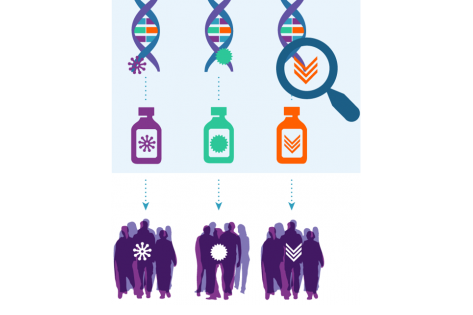
NCI-MATCH precision medicine trial leads to FDA drug approval for BRAF V600E-mutated tumors
August 16, 2022
News in Brief, October 2022
October 13, 2022From the Co-Chairs, August 2022


By Peter J. O’Dwyer, MD (left)
and Mitchell D. Schnall, MD, PhD
 For this edition of the ECOG-ACRIN Newsletter, much has happened that is worth our attention. The first, and most recent event of note is the upcoming appointment of Dr. Monica Bertagnolli (pictured) as the next Director of the National Cancer Institute (NCI), a direct presidential appointment and one that we celebrate for many reasons. First, regarding the appointment itself, as both the first woman and first Cooperative Group Chair to assume the Director position, Dr. Bertagnolli is extraordinarily well-qualified for the role. She epitomizes personal commitment, energy, and enthusiasm for the public system of clinical cancer research. She brings the perspective of clinical and translational enquiry to a position that has often been more basic science‒oriented. Dr. Bertagnolli’s early work on microsatellite instability (MSI) colon cancer led to a focus on this entity as a distinct form of the disease, now validated by the discovery of its sensitivity to immune interventions.
For this edition of the ECOG-ACRIN Newsletter, much has happened that is worth our attention. The first, and most recent event of note is the upcoming appointment of Dr. Monica Bertagnolli (pictured) as the next Director of the National Cancer Institute (NCI), a direct presidential appointment and one that we celebrate for many reasons. First, regarding the appointment itself, as both the first woman and first Cooperative Group Chair to assume the Director position, Dr. Bertagnolli is extraordinarily well-qualified for the role. She epitomizes personal commitment, energy, and enthusiasm for the public system of clinical cancer research. She brings the perspective of clinical and translational enquiry to a position that has often been more basic science‒oriented. Dr. Bertagnolli’s early work on microsatellite instability (MSI) colon cancer led to a focus on this entity as a distinct form of the disease, now validated by the discovery of its sensitivity to immune interventions.
As a surgeon specializing in the management of gastrointestinal malignancies, she has led the Alliance for Clinical Trials in Oncology for the past 12 years, through a time of great change in the cooperative groups, as well as in the field of clinical cancer research generally. During this time, she also served as President of ASCO, where she emphasized bringing state-of-the-art diagnosis and treatment to all parts of our society, and highlighted the challenges of bringing such care to rural populations especially.
In work that is complementary to our data science efforts in ECOG-ACRIN, Dr. Bertagnolli incorporated data extraction from electronic health records as a way to enhance data collection in clinical trials, and set up a data hub through Alliance Foundation Trials to facilitate these activities for all Groups. We continue to develop protocols in collaboration to extend the capabilities of these methods. A successful model in this arena would accelerate assessment and screening activities, populate databases, facilitate auditing, and identify gaps in data at the earliest stages, when they are most likely to be corrected.
Dr. Bertagnolli’s appreciation of these opportunities to improve and expand our research activities will have a profound effect at the NCI, where resources have limited implementation of more novel approaches. While we recognize the realities of limited budgets, we support the development of alternative approaches to funding interventions and methodologies that can accelerate progress, including, for example, public-private partnerships directed to specific challenges. We have had productive discussions on these matters with Dr. Sharpless over the past two years, and hope that we can soon start to implement some of these ideas under the guidance of Dr. Bertagnolli.
In this issue, we also celebrate the recent FDA decision to grant accelerated approval to dabrafenib plus trametinib for the treatment of adult and pediatric patients with tumors harboring a mutation at V600 of the BRAF gene. This is a landmark contribution to drug registration, the second to have resulted from NCI-MATCH trial data (results of nivolumab in MSI-high cancers supported the tumor-agnostic registration of that drug also). Based on NCI-MATCH Arm H data, along with results from a Novartis company trial, the MATCH study team pushed for company and FDA support for this tumor-agnostic indication. Those of you who have spent hours on the phone to obtain insurance coverage for uncommon cancers with this genomic aberration will understand how valuable this decision is for patients with otherwise limited options.
The decision also represents a tangible benefit and proof of principle from the genomically-driven NCI-MATCH study, a major effort of ECOG-ACRIN for the past several years. The structure of the FDA’s Accelerated Approval Program is such that continued approval for this indication may be contingent upon verification and description of clinical benefit in one or more additional trials. We anticipate that relevant data will emerge from the ongoing expansion of Arm H, which we undertook in the expectation that these data would be supportive. We urge you to consider this option for your patients who are identified as having a BRAF V600 mutation.
Read the August 2022 issue here.
![ECOG-ACRIN logo[19516]275×75](https://blog-ecog-acrin.org/wp-content/uploads/2021/03/ECOG-ACRIN-logo19516275x75.png)
